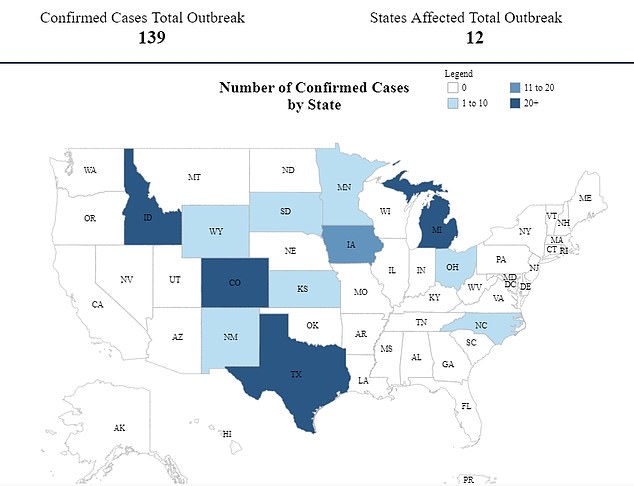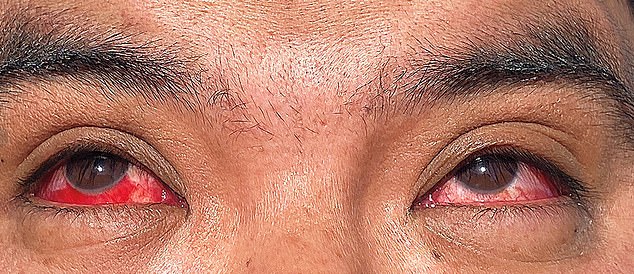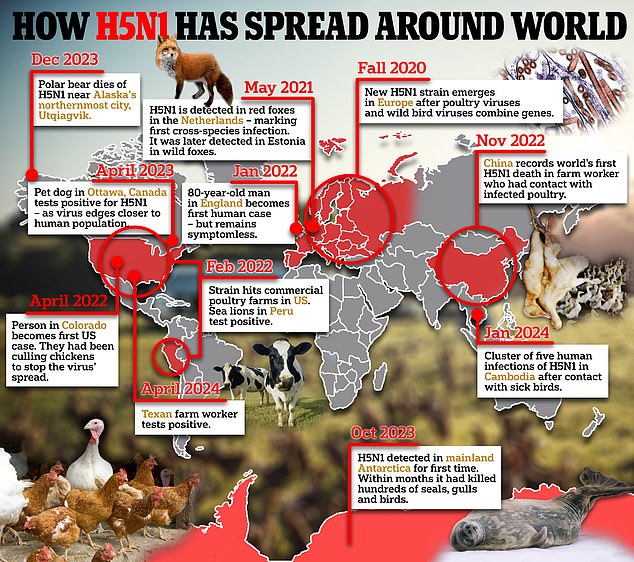Colorado farmer contracts H5N1 bird flu – fourth person infected with deadly virus
A Colorado dairy farmer has been infected with H5N1 bird flu, the fourth human case in the outbreak so far.
The man, whose name has not been released, suffered from mild illness and conjunctivitis (also known as pink eye) and has since recovered from the infection.
He was treated with oseltamivir, or Tamiflu, an antiviral drug used to treat flu infections that had also been used to treat previous patients.
The CDC announced today in a press release that the infection is present and that the risk to the public from bird flu remains low.
It is the fourth case of bird flu identified in the U.S. this year, amid an outbreak of the virus in dairy cows. A case was identified in Texas in March and two cases in Michigan in May.
US government wants to fund late-stage trial of Moderna’s mRNA pandemic bird flu vaccine

The map above shows the locations of the 139 dairy herds where H5N1 infections have been confirmed. They are located in 12 states
The new farmer is believed to have contracted the infection from dairy cattle he worked with in northeastern Colorado. The animal has been confirmed to be infected with the H5N1 strain of bird flu.
There are no known links between this case and the others previously reported. It is suspected that each case is an isolated case of transmission of the virus from cows to humans.
The CDC said in a press release: “Based on the information available at this time, this infection does not change CDC’s current assessment of the public health risk from H5N1 avian influenza, which the agency considers to be low.
‘However, this development underscores the importance of the recommended precautions for people who come into contact with infected animals.’
Recommended precautions include the use of gloves, safety glasses or face masks when working with herds known to be infected with the virus.

Pictured is the Texas farm worker who became infected with H5N1 in March. The infection started in the right eye before spreading to the left eye

Public health officials and epidemiologists were caught by surprise when bird flu infections first emerged among dairy cows in late March of this year.
A total of 139 herds across 12 states have now been infected, raising concerns that the virus could mutate, making it easier to transmit to humans.
Colorado has the most dairy herds infected with bird flu in the past month, with 23 confirmed infections.
The latest human case, like the first two cases reported this year, only had symptoms in the eye, suggesting the virus has not spread to other parts of the body.
In late May, the second case in Michigan caused widespread concern after it was reported that the patient had respiratory symptoms.
Doctors were concerned that the virus had spread to the lungs, where it could mutate and then jump from person to person. However, the patient recovered and there was no sign that they had spread the disease.
In the latter case, CDC scientists confirmed the diagnosis after testing samples sent by Colorado state labs. The tests for influenza came back “inconclusive.”
They have already confirmed that the patient is infected with the H5 virus, and confirmation that it is H5N1, or bird flu, is expected in the coming days.
Further testing of the samples has also been ordered to check for any worrying genetic changes.
CDC officials say they have had numerous conversations with state and local health officials and farmworkers since the case was discovered.
They have also provided the state with more personal protective equipment for farmers and paid for local, targeted advertising warning about the risks of bird flu.
It comes after the FDA revealed it expanded testing for bird flu in dairy products, including ice cream, butter and cheese.
The agency said last week it would test 155 products purchased in supermarkets across the country for the virus.
If one is positive, further tests are done to determine whether the virus is ‘live’ in them, or can cause infection in humans.
Previous tests in laboratory experiments have shown that fragments of the bird flu virus found in products do not replicate, meaning they are ‘dead’, or unable to copy themselves and infect humans.
Officials say this is due to the pasteurization process, which involves heating the milk and then quickly cooling it to kill any microbes.
The expanded testing builds on previous tests, which found the virus in supermarket milk, cottage cheese and sour cream. In all cases, however, the virus was ‘dead’ and could not cause infection in humans.
Minced meat, infant formula and powdered milk were also tested for the virus and all tests were negative.
